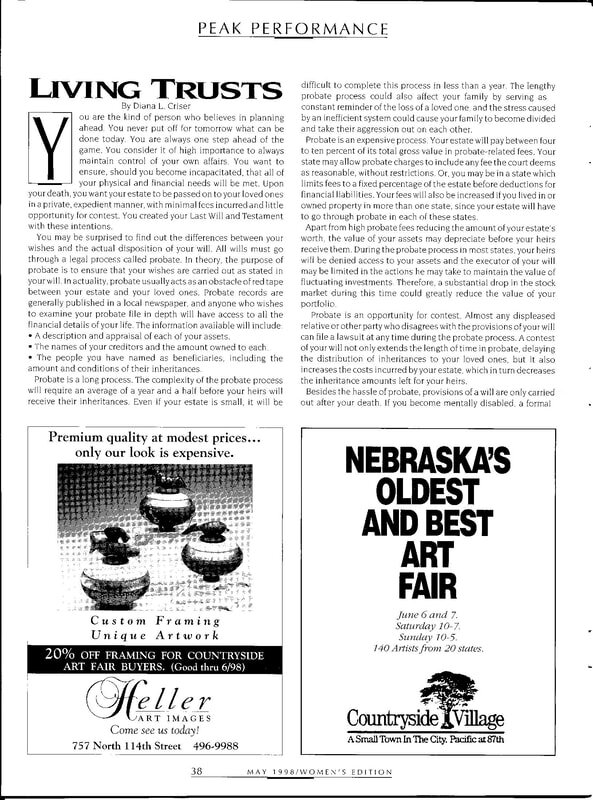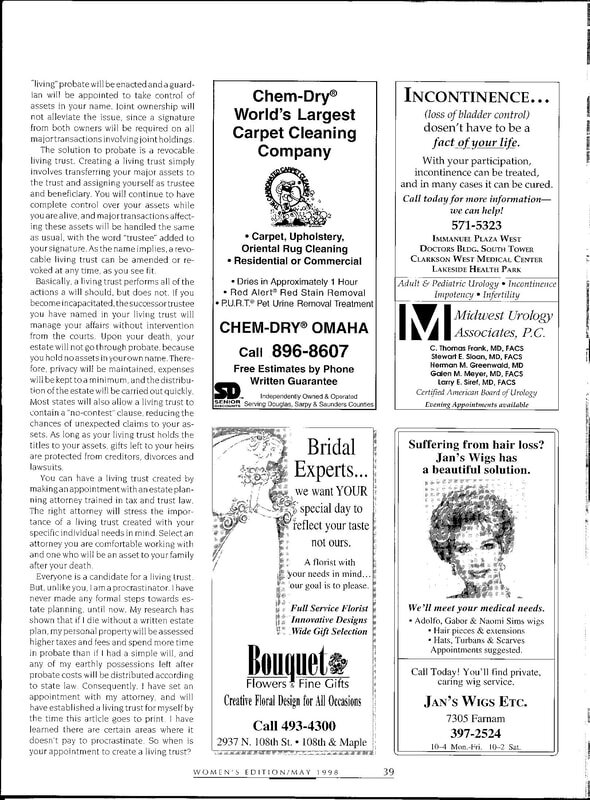Peak Performance - May 1998
LIVING TRUSTS
By Diana L. Criser

ou are the kind of person who believes in planning ahead. You never put off for tomorrow what can be done today. You are always one step ahead of the game. You consider it of high importance to always maintain control of your own affairs. You want to ensure, should you become incapacitated, that all of your physical and financial needs will be met. Upon your death, you want your estate to be passed on to your loved ones in a private, expedient manner, with minimal fees incurred and little opportunity for contest. You created your Last Will and Testament with these intentions.
You may be surprised to find out the differences between your wishes and the actual disposition of your will. All wills must go through a legal process called probate. In theory, the purpose of probate is to ensure that your wishes are carried out as stated in your will. In actuality, probate usually acts as an obstacle of red tape between your estate and your loved ones. Probate records are generally published in a local newspaper, and anyone who wishes to examine your probate file in depth will have access to all the financial details of your life. The information available will include:
Probate is a long process. The complexity of the probate process will require an average of a year and a half before your heirs will receive their inheritances. Even if your estate is small, it will be difficult to complete this process in less than a year. The lengthy probate process could also affect your family by serving as a constant reminder of the loss of a loved one, and the stress caused by an inefficient system could cause your family to become divided and take their aggression out on each other.
Probate is an expensive process. your estate will pay between four to ten percent of its total gross value in probate-related fees. Your state may allow probate charges to include any fee the court deems as reasonable, without restrictions. Or, you may be in a state which limits fees to a fixed percentage of the estate before deductions for financial liabilities. Your fees will also be increased if you lived in or owned property in more than one state, since your estate will have to go through probate in each of these states.
Apart from high probate fees reducing the amount of your estate's worth, the value of your assets may depreciate before your heirs receive them. During the probate process in most states, your heirs will be denied access to your assets and the executor of your will may be limited in the actions he may take to maintain the value of fluctuating investments. Therefore, a substantial drop in the stock market during this time could greatly reduce the value of your portfolio.
Probate is an opportunity for contest. Almost any displeased relative or other party who disagrees with the provisions of your will can file a lawsuit at any time during the probate process. A contest of your will not only extends the length of time in probate, delaying the distribution of inheritances to your loved ones, but it also increases the costs incurred by your estate, which in turn decreases the inheritance amounts left for your heirs.
Besides the hassle of probate, provisions of a will are only carried out after your death. If you become mentally disabled, a form of "living" probate will be enacted and a guardian will be appointed to take control of assets in your name. Joint ownership will not alleviate the issue, since a signature from both owners will be required on all major transactions involving joint holdings.
The solution to probate is a revocable living trust. Creating a living trust simply involves transferring your major assets to the trust and assigning yourself as trustee and beneficiary. You will continue to have complete control over your assets while you are alive, and major transactions affecting these assets will be handled the same as usual, with the word "trustee" added to your signature. As the name implies, a revocable living trust can be amended or revoked at any time, as you see fit.
Basically, a living trust performs all of the actions a will should, but does not. If you become incapacitated, the successor trustee you have named in your living trust will manage your affairs without intervention from the courts. Upon your death, your estate will not go through probate, because you hold no assets in your own name. Therefore, privacy will be maintained, expenses will be kept to a minimum, and the distribution of the estate will be carried out quickly. Most states will also allow a living trust to contain a "no-contest" clause, reducing the chances of unexpected claims to your assets. As long as your living trust holds the titles to your assets, gifts left to your heirs are protected from creditors, divorces and lawsuits.
You can have a living trust created by making an appointment with an estate planning attorney trained in tax and trust law. The right attorney will stress the importance of a living trust created with your specific individual needs in mind. Select an attorney you are comfortable working with and one who will be an asset to your family after your death.
Everyone is a candidate for a living trust. But, unlike you, I am a procrastinator. I have never made any formal steps towards estate planning, until now. My research has shown me that if I die without a written estate plan, my personal property will be assessed higher taxes and fees and spend more time in probate than if I had a simple will, and any of my earthly possessions left after probate costs will be distributed according to state law. Consequently, I have set an appointment with my attorney, and will have established a living trust for myself by the time this article goes to print. I have learned there are certain areas where it doesn't pay to procrastinate. So when is your appointment to create a living trust?
You may be surprised to find out the differences between your wishes and the actual disposition of your will. All wills must go through a legal process called probate. In theory, the purpose of probate is to ensure that your wishes are carried out as stated in your will. In actuality, probate usually acts as an obstacle of red tape between your estate and your loved ones. Probate records are generally published in a local newspaper, and anyone who wishes to examine your probate file in depth will have access to all the financial details of your life. The information available will include:
- A description and appraisal of each of your assets.
- The names of your creditors and the amount owed to each.
- The people you have named as beneficiaries, including the amount and conditions of their inheritances.
Probate is a long process. The complexity of the probate process will require an average of a year and a half before your heirs will receive their inheritances. Even if your estate is small, it will be difficult to complete this process in less than a year. The lengthy probate process could also affect your family by serving as a constant reminder of the loss of a loved one, and the stress caused by an inefficient system could cause your family to become divided and take their aggression out on each other.
Probate is an expensive process. your estate will pay between four to ten percent of its total gross value in probate-related fees. Your state may allow probate charges to include any fee the court deems as reasonable, without restrictions. Or, you may be in a state which limits fees to a fixed percentage of the estate before deductions for financial liabilities. Your fees will also be increased if you lived in or owned property in more than one state, since your estate will have to go through probate in each of these states.
Apart from high probate fees reducing the amount of your estate's worth, the value of your assets may depreciate before your heirs receive them. During the probate process in most states, your heirs will be denied access to your assets and the executor of your will may be limited in the actions he may take to maintain the value of fluctuating investments. Therefore, a substantial drop in the stock market during this time could greatly reduce the value of your portfolio.
Probate is an opportunity for contest. Almost any displeased relative or other party who disagrees with the provisions of your will can file a lawsuit at any time during the probate process. A contest of your will not only extends the length of time in probate, delaying the distribution of inheritances to your loved ones, but it also increases the costs incurred by your estate, which in turn decreases the inheritance amounts left for your heirs.
Besides the hassle of probate, provisions of a will are only carried out after your death. If you become mentally disabled, a form of "living" probate will be enacted and a guardian will be appointed to take control of assets in your name. Joint ownership will not alleviate the issue, since a signature from both owners will be required on all major transactions involving joint holdings.
The solution to probate is a revocable living trust. Creating a living trust simply involves transferring your major assets to the trust and assigning yourself as trustee and beneficiary. You will continue to have complete control over your assets while you are alive, and major transactions affecting these assets will be handled the same as usual, with the word "trustee" added to your signature. As the name implies, a revocable living trust can be amended or revoked at any time, as you see fit.
Basically, a living trust performs all of the actions a will should, but does not. If you become incapacitated, the successor trustee you have named in your living trust will manage your affairs without intervention from the courts. Upon your death, your estate will not go through probate, because you hold no assets in your own name. Therefore, privacy will be maintained, expenses will be kept to a minimum, and the distribution of the estate will be carried out quickly. Most states will also allow a living trust to contain a "no-contest" clause, reducing the chances of unexpected claims to your assets. As long as your living trust holds the titles to your assets, gifts left to your heirs are protected from creditors, divorces and lawsuits.
You can have a living trust created by making an appointment with an estate planning attorney trained in tax and trust law. The right attorney will stress the importance of a living trust created with your specific individual needs in mind. Select an attorney you are comfortable working with and one who will be an asset to your family after your death.
Everyone is a candidate for a living trust. But, unlike you, I am a procrastinator. I have never made any formal steps towards estate planning, until now. My research has shown me that if I die without a written estate plan, my personal property will be assessed higher taxes and fees and spend more time in probate than if I had a simple will, and any of my earthly possessions left after probate costs will be distributed according to state law. Consequently, I have set an appointment with my attorney, and will have established a living trust for myself by the time this article goes to print. I have learned there are certain areas where it doesn't pay to procrastinate. So when is your appointment to create a living trust?
DROP ME A LINE
Like what you see? Let's get in touch!
Diana Criser, CUA, CXA
User Experience Practitioner
Omaha, Nebraska
User Experience Practitioner
Omaha, Nebraska
402.598.4969


